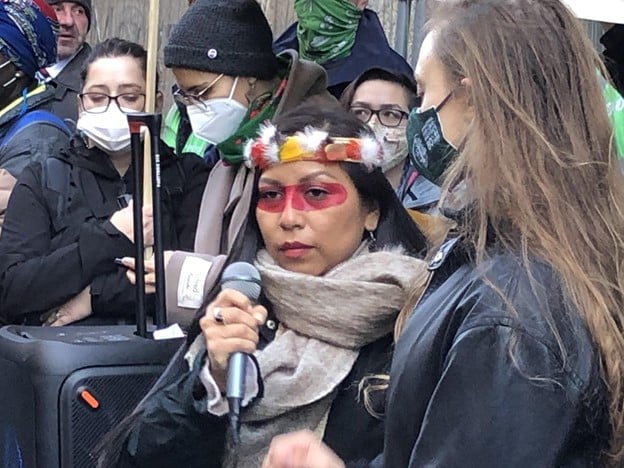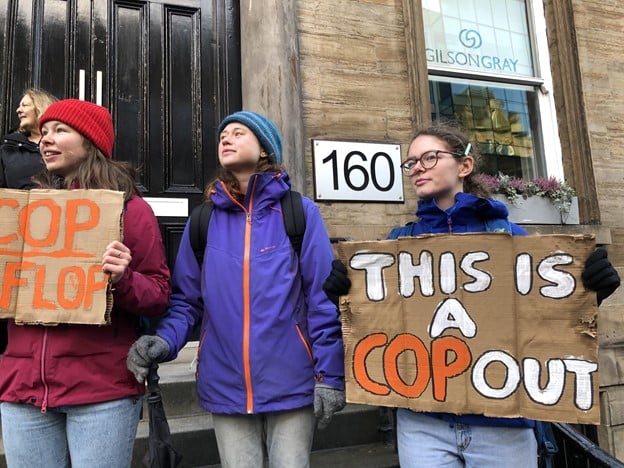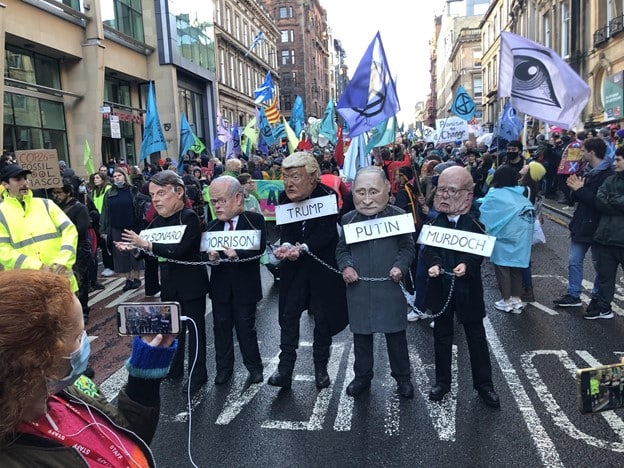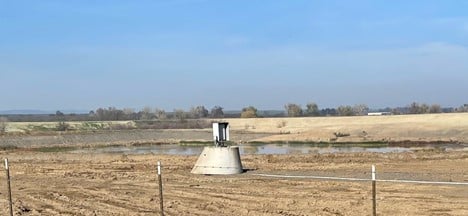
Seeds of Justice:
Message from COP26:
Defend What You Love
by Juliette Beck

From Glasgow to Davis: A local perspective on COP26 by Juliette Beck
Published as a commentary by the Davis Enterprise on Sunday, November 28, 2021
When looking at Earth from outer space, astronauts have experienced a transformative shift in awareness called the “overview effect.” They describe seeing a magnificent, swirling blue orb separated from infinite darkness by a thin silver line – our atmosphere. From this viewpoint, the fragility of our living planet and the pettiness of human borders become clear.
I recently saw our planetary home, not from above, but from below, through the eyes of people worldwide that are witnessing — and actively resisting — the systematic destruction of the Earth’s interconnected life-support systems. In my ‘underview’, I heard testimonies from the Amazon basin to the Niger delta to the Himalayan plateau to Australia and Turtle Island (North America) — regions that have sustained civilization for tens of thousands of years that are now being flooded, eroded, scorched, denuded, and saturated with toxic chemicals, plastic, fossil fuel and waste.
Hundreds of community leaders had traveled to Glasgow, United Kingdom from the frontlines of the climate crisis to urge the world’s governments that had gathered for the United Nations Conference of Parties (COP26) to protect not only their ancestral homelands, but the livability of the the planet for all humanity and future generations.

Wearing the brightly-colored feathered headdress of her Waorani tribe, Nemo Andy Guiquita addressed a large crowd that had gathered in front of the Scottish headquarters of US multinational JP Morgan Chase, the largest financier of the fossil fuel industry globally.
“The animals are dying, the plants are dying, the rainforests are dying. Governments and banks like JP Morgan Chase that are financing the extraction of fossil fuels from our territories are criminals, killing our people, destroying our territories,” shared Guiquita, the director of women and health for the confederation of Indigenous nationalities of the Ecuadorian Amazon (CONFENIAE).
“Indigenous people (resisting fossil fuel extraction) are not the problem – we are the solution,” she stated proudly.
Indigenous tribes such as the Waorani of South America and the Standing Rock Sioux and the Wet’suwet’en of North America are doing what leading governments have failed at. They are battling the culprits of climate change – fossil fuel corporations and their powerful investors — whose extraction and production of oil and gas is at the root of the crisis.
As Marco Lemus, a young urban gardener from Richmond, CA where Chevron’s oil refinery recently caused the closure of three schools from foul air, told the crowd, “We gotta keep that sh**t in the ground!”
COP-Out

The official aim of this year’s COP was to implement the 2015 Paris Accord, committing nearly 200 countries to keep global average temperature rise to no more than 1.5 degrees Celsius above pre-industrial levels. Yet Climate Action Tracker estimates that the national pledges made at COP26 are less than half of what is needed by 2030. At this rate, with greenhouse gas emissions still rising precariously, they predict a 2.4 degree temperature increase by the end of the century.
Developed countries were also expected to make good on the promise made in 2009 to provide $100 billion a year to help highly impacted countries in places like the Pacific Islands and Sub-Saharan Africa that have already passed the 1.5 degree threshold and are struggling to cope with ever more extreme weather.
Many pointed to the return of the U.S. – the largest historical carbon emitter – as a sign of progress. Despite the welcome change in presidential rhetoric, behind the scenes, the U.S. focused on dodging liability and opposing a key climate justice provision – “loss and damage” payments to highly impacted countries that have contributed the least to the problem but are suffering the brunt of the consequences. Biden’s decision, just four days after talks concluded, to launch an auction of oil and gas leases for a record 80 million acres in the Gulf of Mexico suggests sadly that there is no real change of direction.

Corporate Power vs. Democracy
The failure of governments at COP26 to bridge the emissions gap and finance a just transition is not surprising given the entrenched power of neoliberal global economic institutions. The World Trade Organization and other trade pacts grant multinational corporations — including oil and gas companies as well as pharmaceutical giants – turbo-charged “rights to profit” regardless of the environmental and social impacts.
Research by the UK-organization Global Justice Now shows that the same energy companies that are fueling the climate crisis are suing governments using secretive “corporate courts” written into trade deals for more that $18 billion. Energy giant RWE and Uniper have sued the Netherlands over its coal phase-out, while TC Energy is suing the US over the cancellation of the Keystone tar sands oil pipeline.
With the presence of more than 500 fossil fuel industry lobbyists at COP26 (larger than any country delegation), it is not surprising that the UN talks failed to produce clear and just strategies for phasing out fossil fuels. Former Bolivian ambassador to the UN Pablo Solon suggested that to have a fair and effective outcome within the COP framework, fossil fuel corporations should be banned from the talks, and representatives from indigenous nations and nature itself should be brought to the negotiating table.

Just Ecological Transition
While the events in Glasgow may seem far removed from our daily lives, the message I heard from indigenous defenders of the planet is that we all have to play a role in changing the dominant economic system. The indigenous emphasis on buen vivir – wellbeing – offers a much-needed alternative to a globalized system based on limitless consumption and extraction.
Domingo Peas of the Achuar tribe said on the US radio show Democracy Now!, “ All of us have to work together — young people, old people, women, men, every sector of society, government. We must work together for our common future. And it is that transition, ecological transition, is what we’re seeking. And that work begins within ourselves. We must first change our relationship to nature, change the way we think about the world, and really put at the center of our thinking our connection to life and our commitment to future generations.”
From a global “underview” perspective, local governments have a critical role in the transition to a decarbonized, climate resilient, equitable economy. Local elected officials should start by supporting initiatives that build community-wealth and well-being, such as cooperatively-owned businesses, farms and housing, rather than locking us into unsustainable development projects that expand highways, suburban sprawl and ecologically destructive mining.

As Greta Thunberg said at COP26, leadership will not come from above, it will come from below. We have to treat the climate crisis as the emergency it is. Let’s all double down on stopping industrial extraction and focus on healing, repairing, and learning to live sustainably here and now on the only planet we can call home.
–Juliette Beck, a Davis resident, attended the COP26 People’s Summit in Glasgow, UK, November 5-10.


